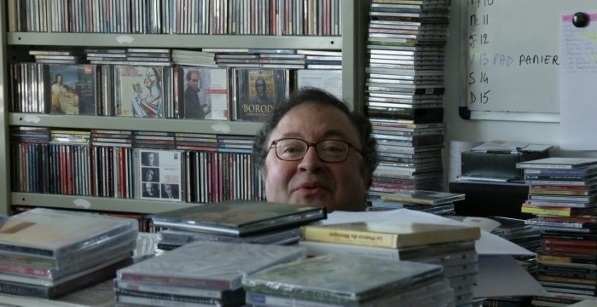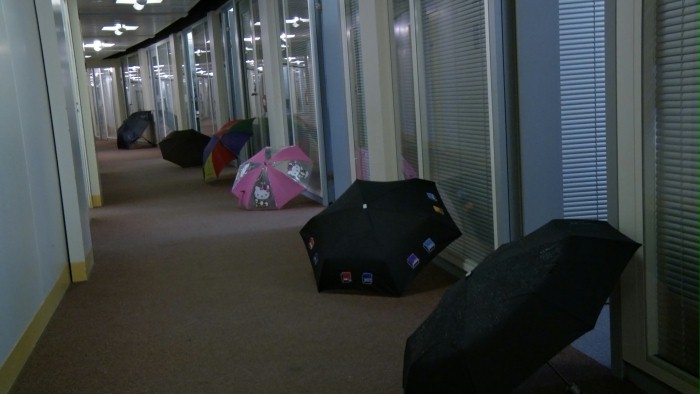It can be tricky to be a talented documentarian without having an addiction to challenges. Director Nicolas Philibert enjoys one challenge too many when his camera rolls. One of the most influential of French documentarians, Philibert has often preferred to drown his works in total silence as it happened with In the Land of the Deaf (1992) and To Be and to Have (2002). This time around he goes to the opposite direction; his new film La maison de la radio—which premiered at the last Berlinale in the Panorama Dokumente section—is all about voices, sounds, jingles and music. With his camera Philibert x-rays that big building at 116 Avenue du Président Kennedy in Paris, where Radio France has its headquarters. He explores aisles, recording studios and offices trying to unveil what he defines “the mystery of radio.” He does not spare us interesting images such as the one of a reporter preparing her text using Braille language, nor interesting moments when choosing to film the interview of Italian celebrated author Umberto Eco. Philibert’s sense of cinema never stops trying to push the boundaries of the documentary and its traditional rules. Actually he seems to have no rules but one: never spoon-feed your audience.
Keyframe: Of all the possible arts in the world, why did you choose film, and, more specifically, why documentaries as your medium?
Nicolas Philibert: I did not choose, it chose me. I was an intern and then a production assistant. I never went to film school, I simply worked in that field. But it was not documentary, it was all fiction and step by step I got more involved. Then one day I thought I should try making my own film. By chance this happened to be a documentary, His Master’s Voice in 1978. I realized I had no clue about documentary filmmaking and those first experiences and they were amazing. So I did a second one and a third one and a fourth one, etc. The field and the possibilities are endless, I never get tired of doing another one. But I have to say for some reason my documentaries are rather narrative-film-like. They are as much fiction film as they are documentaries. To be honest—I do not know what ‘reality’ even is, I just film what I see and it becomes fiction that way. It is my personal interpretation of the world. There is this saying, ‘All reality is fiction,’ you know?
Keyframe: This reminds me a bit of Gabriel García Marquez’s ‘magical realism.’ On the one hand your films are documentaries and rather realistic, on the other hand you have a very specialized view of your subjects. Your films are very human und loving. Especially your new film La Maison de la radio could have been a very cynical and exposing film but you chose otherwise…
Philibert: I despise cynicism.
Keyframe: But one makes more money with exposure and cynicism…
Philibert: I will never mock my subjects or expose them. I respect the people I film. I do not want to force myself into anybody’s life. I love what I film, I love people. My film contains what people willingly expose to me. I am well aware of the importance of the images and words. One can kill another with images and words, one can harm them, make them angry, but this is not my way. I want to love and respect my protagonists. It is so easy to mock others and have the camera rolling. It is so much harder not to point a camera at something. The art is to know what to film and even more to know what to leave out. Nowadays those new tiny cameras allow everyone to film everything. There is this new attitude that everything must be recorded without selection. For me it is important to think about the images, to present some onscreen, but to leave the most off-screen, to leave it to the imagination of the viewer. This is the way to get the audience engaged, to make them think. The internet is this machine of “show it all” and ‘tell it all’ and people simply get lost in the abundance. There is this tendency to put oneself in the center of all images. This is wrong. One needs to carefully think about what to film.
Keyframe: Is this the reason why there are no commentaries whatsoever in La Maison de la radio?
Philibert: There is no commentary because I have absolutely nothing to say. I do not make films to introduce my ideas and my knowledge to the people. The origin of my work is uncertainty, not knowledge. My films are cinema, they are cinematic art and not sociology.
Keyframe: What do you mean by ‘they are cinematic art and not sociology ?’
Philibert: One should see that when watching my films.
Keyframe: Well, yes, one does, but I made an interesting observation when watching your film. The younger ones in the audience mentioned in confusion that there was no commentary and ‘only images.’ I was asking because you deliberately choose to comment with the images or rather with everything you leave out, the off-screen is your comment…
Philibert: Hmm. [Thinking.] The audience is important to me, I take them seriously and want them to keep their free will and their own interpretation. I can imagine that your generation gets confused with this, they are used to having everything spoon-fed to them. And here is me, not doing this, not telling them what to think but rather leaving lots of space for them to make up their own mind.
Keyframe: Well, thank you for adding me to this young generation; I am flattered, I guess.
Philibert: You’re welcome. But tell me, what kind of commentary would you have hoped for or expected?
Keyframe: Well, I really don’t know. Personally I appreciated the fact that I could just indulge in the images and get a feel for the people of Radio France which you are portraying. So did many others. However, some were simply surprised that they were given this freedom of free thinking and interpretation…
Philibert: That is quite interesting and strange. But I have heard this before. It bothers me, as commentaries for me are something that belonged to the old, conservative ‘cinema du papa’ [‘daddy’s cinema’]. This is a paradox to me. Many young people nowadays are extremely conservative and retrograde. Documentary film art is expanding and developing into new and exciting directions, it is time for the young to realize and acknowledge that.
Keyframe: Allow me to explore the reasons behind La Maison de la Radio with my last questions. Why did you choose the big French radio station as your subject? I mean, per definition radio lacks the image. And here are you adding images to the voices.
Philibert: Exactly! This is exactly what interested me. What a challenge! It might be absurd to make a film about radio. But this is my main theme, my main goal in cinema: to make films about things that nobody would ever expect. Radio is a mystery, it has many secrets and it was of utmost importance to me that those are not revealed. I loved this challenge!
Keyframe: Do you think you succeeded in keeping the secret?
Philibert: This is not for me to say. The audience, the people watching are the ones to make that decision.
Keyframe: Right, I forgot. No commentary whatsoever.
Philibert: Haha! Exactly.
Beatrice Behn is a German film critic, curator and festival director of the International Comedy Film Festival.





